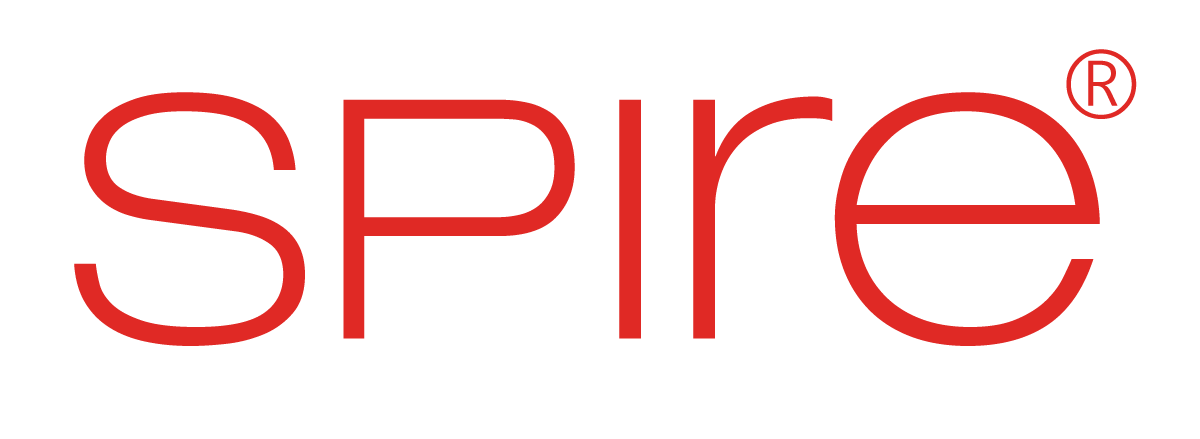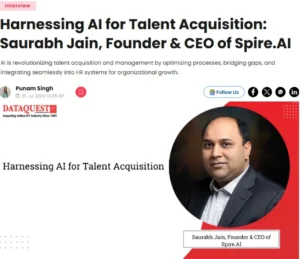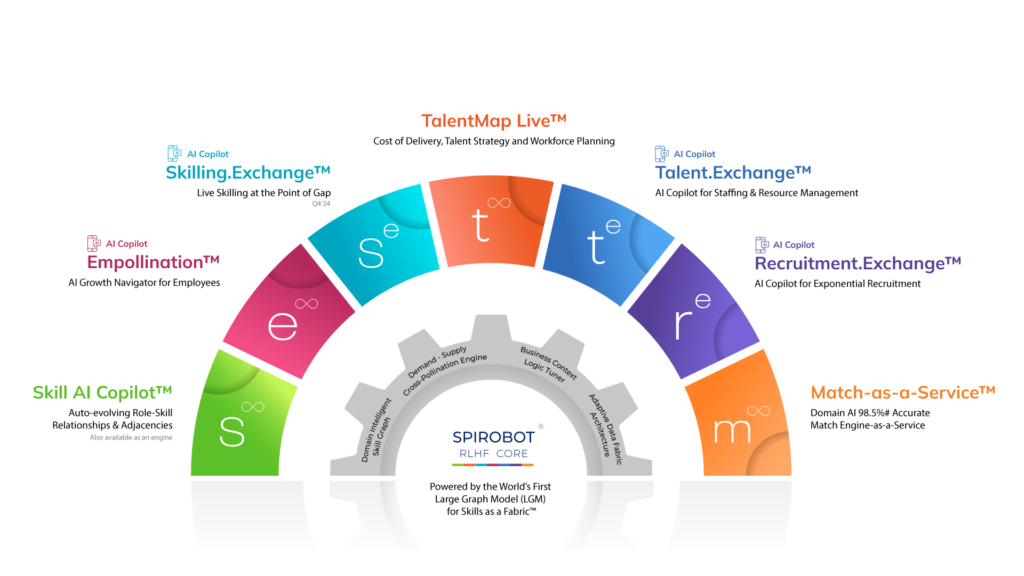Read insights by our CEO, Mr. Saurabh Jain, about how organizations can leverage Domain-Intelligent AI to create a sustainable and high-impact talent acquisition operating model in this exclusive interview with Dataquest –
Link to article: Harnessing AI for Talent Acquisition: Saurabh Jain, Founder & CEO of Spire.AI
In the ever-evolving talent landscape, traditional recruitment methods, reliant on generic job postings and resume screening, are no longer enough to attract and retain top talent. Here’s where AI in talent acquisition comes in. AI can revolutionize how organizations source, attract and retain the highly skilled candidates they need to succeed. This blog explores how AI for HR solutions can bridge talent gaps by leveraging domain-specific knowledge. We’ll delve into Mr. Saurabh Jain’s (Founder & CEO of Spire.AI) interview with Dataquest to understand how domain-specific AI tools for HR can optimize recruitment and transform talent management.
The Limitations of Traditional Recruitment
- Generic job postings: One-size-fits-all job descriptions must capture the role’s essence and the specific skills required for success. This can lead to a flood of unqualified applications and make it difficult for genuinely qualified candidates to find the right opportunities.
- Inefficient screening: Resumé screening can be tedious and error-prone, especially for high-volume hiring. Traditional methods often rely on keyword matching, which can overlook candidates with the right skills and experience if they don’t use the exact terminology. Additionally, unconscious bias can creep into the screening process, excluding qualified candidates from diverse backgrounds.
- Limited candidate pools: Traditional sourcing methods, such as job boards and social media, may not reach the most relevant talent pools. This can make finding candidates with the niche skills and experience required for specialized roles can be difficult.
AI in Talent Acquisition: A Game-Changer
AI applications in talent acquisition offer a powerful solution to these challenges. AI-powered talent acquisition platforms can:
- Personalize job postings: AI can tailor job descriptions to specific skills and experience, attracting a more qualified pool of applicants.
Mr. Saurabh Jain, CEO of Spire.AI, highlights this importance: “By understanding the domain and business context of various industries, AI can automatically contextualize skills demand and supply by understanding skill relationships, adjacencies, recency, and proficiency.”
This allows you to create targeted job descriptions that resonate with suitable candidates and showcase the role’s unique value proposition.
- Automate screening: AI can efficiently screen resumes for relevant skills and experience, reducing bias and saving recruiters valuable time. AI can analyze a broader range of data points than traditional methods, such as a candidate’s online presence and project history, to provide a more comprehensive assessment of their qualifications. This allows recruiters to focus on the most promising candidates and spend more time interviewing and building relationships.
- Identify top talent: AI can analyze vast amounts of data to identify candidates with the right skills and cultural fit. AI can go beyond simply matching keywords on a resume. It can analyze a candidate’s work experience, educational background, and even social media profiles to assess their cultural fit and potential for success within your organization. This ensures you’re attracting candidates who are qualified for the role and a good fit for your company culture.
However, not all AI solutions are effective solutions for talent management, and the adoption of AI in talent management is often not done right. Generic AI can only be effective with a deep understanding of industry-specific needs.
“Despite the widespread adoption of AI in talent acquisition, many solutions fall short because they rely on generic data models that do not understand industry-specific contexts. These models often provide solutions for high-level workflows rather than organizational talent challenges, leading to limited effectiveness. Current AI platforms frequently need more depth to address the specific needs of all talent acquisition stakeholders, including recruiters, hiring managers, agencies, staffing firms, and individuals. Also, the insights these platforms provide are often generic and a one-size-fits-all solution, which can lead to incorrect or misleading results.” – Excerpt from an interview with Dataquest by Mr. Saurabh Jain, Co-Founder & CEO Spire.AI.
The Power of Domain-Intelligent AI
This is where domain-intelligent AI enters the scene. These AI tools for HR are trained on industry-specific data, enabling them to provide a significant advantage over generic AI solutions. Here’s how domain-intelligent AI empowers organizations to unlock the true potential of their workforce:
Understanding Skill Relationships: Traditional AI solutions often need help understanding the complex relationships between different skills. For instance, data scientists may possess skills in programming languages like Python and R. Still; they might also need strong statistical modeling expertise and domain knowledge specific to their industry. Domain-intelligent AI can identify these intricate connections and create a more holistic picture of a candidate’s skill set.
As our CEO, Saurabh Jain, points out, “These platforms understand the domain and business context of various industries, automatically contextualizing skills demand and supply by understanding skill relationships, adjacencies, recency, and proficiency.”
This allows for a more precise evaluation of a candidate’s qualifications and ensures you pay attention to highly skilled individuals simply because their resume doesn’t match the listed keywords perfectly.
Focus on Relevant Skills, Not Just Keywords: Generic AI tools prioritize candidates based on the number of times specific keywords appear on their resume. This approach can lead to a pool of candidates with the correct jargon but not necessarily the most relevant skills or experience. Domain-intelligent AI, on the other hand, can delve deeper. Understanding the nuances of your industry and the specific requirements of the role can identify candidates with the right skills and experience, even if they use different terminology on their resumes. This ensures you’re attracting a pool of qualified candidates who can significantly contribute to your organization.
Identifying Future Skill Needs: The business landscape constantly evolves, and the skills required for success change rapidly. Domain-intelligent AI can analyze industry trends and data to pre-identify the skills your organization might need. This allows for proactive talent acquisition strategies. You can identify potential skill gaps early on and develop targeted training programs to upskill your existing workforce or source candidates with the necessary skills for emerging roles.
Building a Competitive Advantage: In today’s competitive talent market, attracting and retaining top talent is critical for organizational success. Domain-intelligent AI empowers you to make data-driven decisions throughout the recruitment process. You can identify the best-fit candidates, personalize the candidate experience, and build a strong employer brand. This will help you attract top talent and gain a competitive edge in the war for talent.
By leveraging domain-intelligent AI, you can transform your recruitment process from a time-consuming and reactive exercise to a strategic and proactive approach to talent acquisition. This will empower you to build a high-performing workforce with the skills and expertise necessary to drive innovation and achieve long-term success.
Spire.AI: Your Domain-Intelligent AI Copilot
The Dataquest interview with Mr. Saurabh Jain, CEO of Spire.AI, sheds light on how the Spire.AI domain-intelligent AI platform empowers organizations to optimize talent acquisition. Here are some key takeaways:
- Spire.AI acts as an AI copilot, assisting recruiters and hiring managers throughout the recruitment process.
- The platform automates skill profiling, eliminating manual data entry and ensuring accurate candidate profiles.
- Spire.AI fosters internal mobility by identifying suitable candidates within the organization for open positions.
- It provides personalized learning recommendations, empowering employees to take ownership of their career development.
The Expanding Reach of Domain-Intelligent AI: Beyond Talent Acquisition
While talent acquisition is a primary focus area for domain-intelligent AI, its applications extend far beyond the recruitment process. Here, we explore how this technology impacts other aspects of HR and the broader business landscape.
1. Bridging the Talent Gap
Finding qualified candidates is just one piece of the puzzle. Domain-intelligent AI can also help organizations address the ever-widening skills gap within their workforce. By analyzing skills data and identifying potential gaps, AI can recommend targeted training programs to upskill employees and ensure they have the skill sets to stay competitive.
As Mr. Saurabh Jain points out, “AI can play a crucial role in identifying these skill gaps and creating personalized learning pathways for employees to bridge them. This empowers employees and ensures the organization has the future-proof workforce it needs to thrive.”
2. Integrating AI into Existing HR Systems
Integrating AI seamlessly into existing HR systems is crucial for maximizing its benefits. Spire.AI’s platform, for instance, is designed to complement existing workflows, not replace them.
Mr. Saurabh Jain emphasizes this: “We believe in the power of collaboration between AI and HR professionals. Our AI is an intelligent assistant, automating tedious tasks and providing data-driven insights to empower HR teams to make informed decisions.”
3. User Adoption: Strategies for Successful AI Implementation
The success of any AI implementation hinges on user adoption. To ensure HR teams and hiring managers fully embrace and effectively leverage AI-powered tools, Spire.AI employs several strategies, as highlighted by Mr. Saurabh Jain in the interview:
- Change Management Support: Spire.AI recognizes the importance of change management during AI implementation. We provide support to help HR professionals adjust to new workflows and understand how AI can augment their capabilities.
- Focus on User Outcomes: The platform is designed to deliver concrete benefits to HR teams.
- Community Building and User Feedback: Spire.AI fosters a community of users who can share best practices and learn from each other. Additionally, they actively solicit user feedback to continuously improve the platform and ensure it meets the evolving needs of HR professionals.
Mr. Saurabh Jain correctly emphasizes, “We focus on user outcomes. It’s not just about fancy features, but about demonstrating the tangible value that AI can bring to the recruitment process.”
4. Responsible AI: Considerations for Ethical Use
As with any powerful technology, the responsible use of AI is paramount. Here are some key considerations to ensure the ethical and beneficial use of AI in business operations:
- Data Bias: AI algorithms are only as good as the data they’re trained on. It’s crucial to ensure training data is diverse and free from bias to avoid perpetuating inequalities in the workplace.
- Explainability and Transparency: As discussed earlier, transparency in AI decision-making is essential for building trust and ensuring fairness. Organizations should be able to explain how AI arrives at its conclusions.
- Human Oversight: AI should never replace human judgment. HR professionals should oversee recruitment and utilize AI to enhance their decision-making capabilities.
The Future of Talent Acquisition with AI
Looking ahead, domain-intelligent AI will play a pivotal role in shaping the future of talent acquisition. Here are some emerging trends:
- Skill-based talent acquisition: Organizations will focus on identifying and acquiring talent based on the specific skills needed rather than just job titles.
- The rise of AI copilots: Domain-Intelligent AI will become an integral part of the recruitment process, assisting HR professionals in making data-driven decisions.
- Emphasis on internal mobility: Organizations will leverage AI to identify and develop talent within their workforce.
- Building inclusive talent pipelines: AI tools can help create a more inclusive recruitment process, attracting diverse talent pools.
Conclusion
In today’s competitive talent landscape, AI in talent acquisition is a game-changer for moving from traditional TA methods. However, a domain-intelligent AI copilot is essential to build a talent acquisition operating model that considers an organization’s business context and long-term goals.
Organizations can bridge talent gaps, optimize recruitment processes, and build a future-proof workforce by leveraging domain-intelligent AI.
As Mr. Saurabh Jain rightly points out, the future of HR is “intelligent, strategic, and inclusive,” powered by domain-intelligent AI platforms that streamline talent management and align it directly with business goals.
Frequently Asked Questions
How can AI be used in talent acquisition?
AI can be used in talent acquisition to:
- Personalize job postings to attract the right candidates.
- Automate resume screening to save time and reduce bias.
- Identify top talent with the right skills and cultural fit.
Why is AI good for recruitment?
AI is good for recruitment because it
- Makes the process more efficient by automating tasks.
- Reduces bias by focusing on skills and experience rather than keywords.
- Helps find top talent by analyzing a wider range of data.







